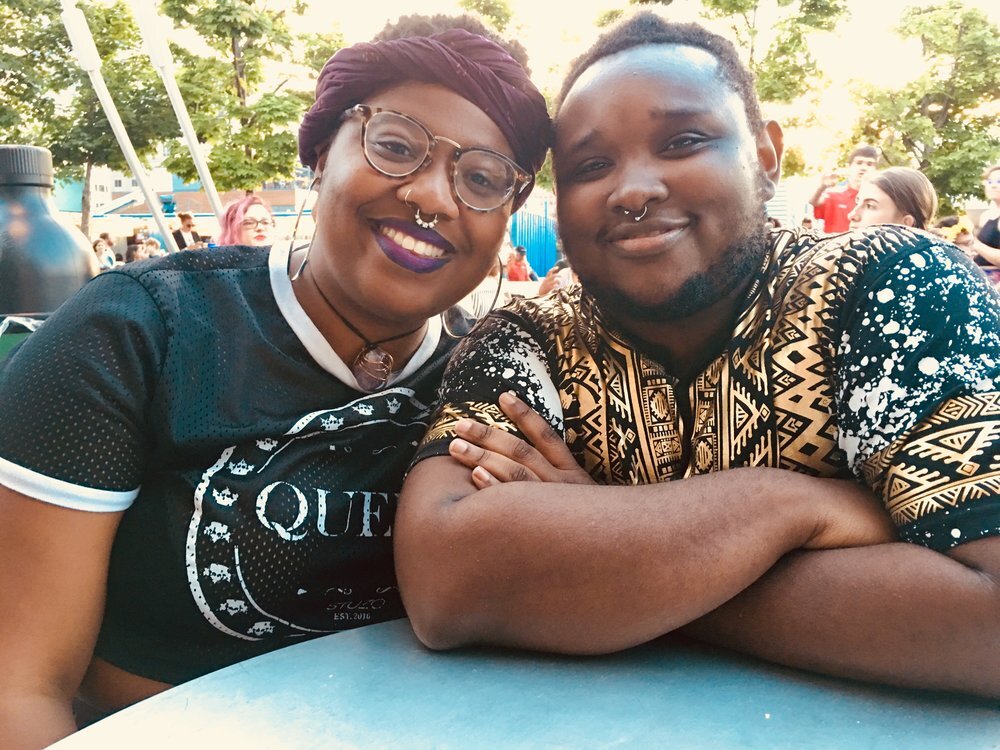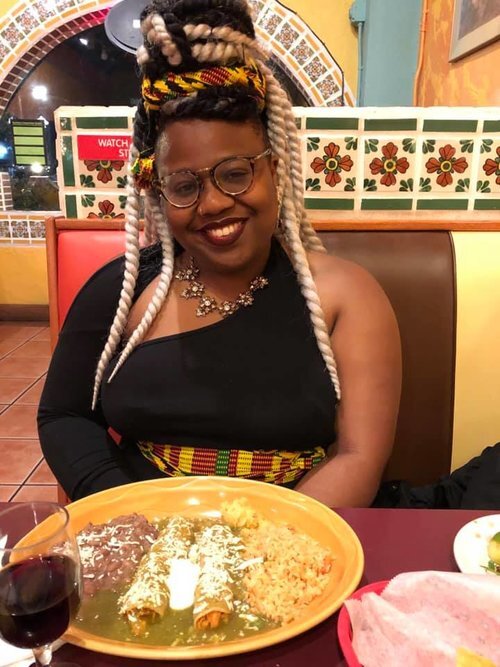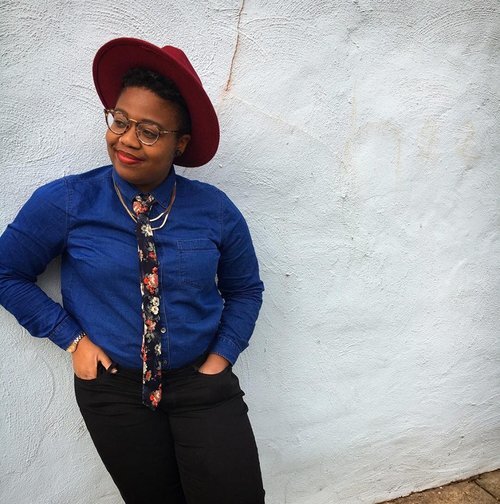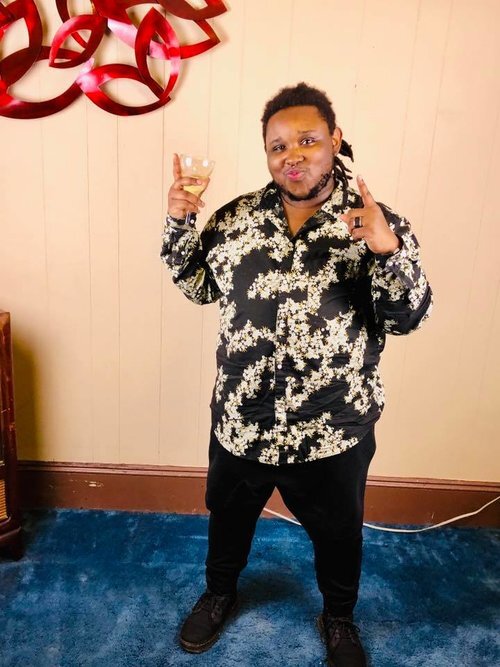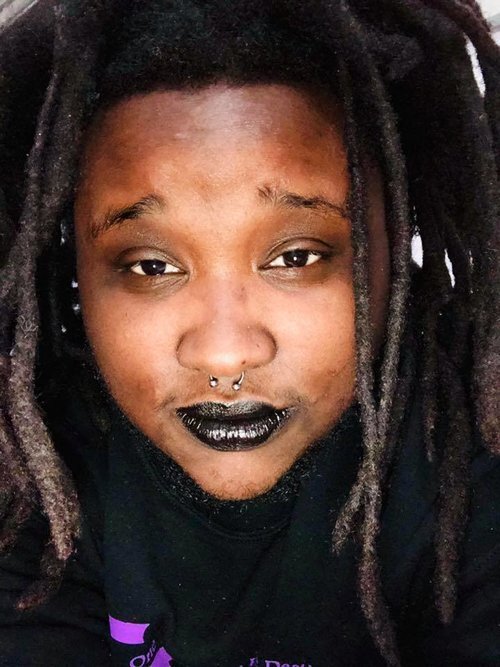Queer, Black, and in Love
Eziah Blake (they/them/theirs and he/him/his) also known as “Black Bear Extraordinaire,” is a 29-year-old Black, queer, and trans spoken word artist, singer, activist, from Dorchester, Massachusetts. Tanekwah Hinds (she/her/hers) is a bisexual, femme-dapper, Jamaican-American woman community organizer, activist, and health educator in Boston. They met at a queer community art event, and after that, the rest was history. For Valentines Day and Black History Month, we invited them to reflect on their style and relationship as a Black queer couple.
Tanekwah Hinds (left) and Eziah Blake (right)
How has your style changed since you got together?
Tanekwah: I tend to dress a little bit more feminine, which is something that I’m conflicted about. I think as much as I try to resist the gender binary and heteronormativity that I still succumb to the pressure, as the world perceives my partner and I as straight. But there is also strength and power in femininity. For the most part, I still embrace my dapper-femme style as I mix traditionally masculine clothes and accessories with a feminine touch, sometimes skewing more on one spectrum than another.
Eziah Blake: My style has definitely changed since Tanekwah and I have been together. She really introduced me to floral patterns and brighter colors. I wore them at first because she thought I looked cute in it. But then I took a liking to it. When I told her that I was interested in wearing black lipstick for the first time, she couldn’t wait to get it on me. Because of rigid gender norms enforced by society, I didn’t think something like that was possible even a year ago.
How do you feel about the representation of Black queer love in queer media?
Tanekwah: I would say in mainstream media, the representation of Black queer love is not very present. If it is, the relationship is usually through a very heteronormative lens. There is supposed to be someone who wears the pants and someone who is the caretaker, or more feminine, which caters to the gaze of straight people. I think the positive images that do exist are mostly gay men or lesbian women. I don’t see much representation of relationships for folks from our backgrounds whether it’s individuals who are bisexual or trans or Black. The media could really benefit from showing queer love that exists beyond whiteness and the gender binary.
Eziah: I echo what Tanekwah said. I would also add that our media representation also suffers from colorism. Light skin folks are still seen as more desirable and represented in relationships and love. As a dark skin person, seeing that in the past has made me think I’m not one to be desired or attractive. I think giving more visibility to darker queer folks is important for the media moving forward.
Who inspires your style?
Eziah: I really love Janelle Monáe. Her new album is dope. I’m not sure that I have an inspiration for my style. I kind of just get clothes that I’m drawn to or I think will look good on me and reaffirm my gender and my body. I have different looks depending on how I feel.
Tanekwah: I look at different sources on social media for style inspiration. I especially like to draw inspiration from Instagram accounts for clothing, accessories, and makeup, like @DapperQ, @BowtieBehavior, and @ColourPop, and then mix and match different trends that I’m attached to. I really like to use my style to experiment with the fluidity of my sexual orientation and gender expression. Floral button-ups, over-sized sweaters, and patterned ties and bow ties catch my eye in the men’s department. My feminine statement pieces include a bold lipstick and eye shadow as well as geometric jewelry, head-wraps, and long cat nails. Like Eziah, I would definitely say that Janelle Monáe is a major inspiration. She was the first visibly Black woman who I saw rock dapper clothing with such confidence. I try to exude that same energy.
Where do you like to shop?
Tanekwah: I have really come to like Express lately. The store has these detailed, colorful patterned and floral shirts in their traditional men’s section that I love. I also shop this section at Old Navy and Primark for cheap finds. I shop for some of my more feminine clothes at Rebdolls, a size-inclusive online outlet. The internet also connects me to Black businesses, such as Bowtie Behavior and Philadelphia Print Works.
Eziah: I like to shop at Primark, Marshall’s and occasionally Old Navy. I want to look good but I’m not trying to break the bank. It’s hard out here. I think each of these places has really affordable clothes that are super stylish and provides me with options.
Walk us through your favorite outfit?
Eziah: My favorite outfit definitely has gold involved. I love gold. Right now, I’m really feeling one of my recent looks. I’ve got gold sneakers, a gold & black letterman jacket, some black sweats, and a black & gold dashiki shirt. And to tie it all together I add the black lipstick and give my dreads that Kilmonger vibe. #WakandaForever
Tanekwah: I would say my favorite outfit would be a button-up with bright colored floral patterns, a bowtie that plays up the bright colors, and a solid pants that pulls it altogether with dress shoes. I also think that an outfit is more than just the clothes. It’s the makeup and accessories as well. I really like to play up the color themes of the outfit with bright eye shadow and lipstick. Accessories are also everything from the tie to the hat to the watch.
How do you use fashion as a form of resistance against racism and queerphobia/ transphobia?
“My fashion gives me the confidence to resist and continue to organize. When you look good, you feel good .”
Tanekwah: To defy the notion that women can only wear feminine clothes. I embrace the fluidity of gender expression through my femme-dapper style. I also support small Black businesses, as white outlets and designers have historically dominated fashion choices. My fashion gives me the confidence to resist and continue to organize. When you look good, you feel good .
“My first act of resistance is: I know I’m cute. I know I’m not supposed to think so because I’m dark, fat and trans. But I do and when I have on a look that really makes me feel good can’t nobody tell me nothing.”
Eziah: My first act of resistance is: I know I’m cute. I know I’m not supposed to think so because I’m dark, fat and trans. But I do and when I have on a look that really makes me feel good can’t nobody tell me nothing. I’m trans “masculine” but if I wanna wear lipstick I will. I think it’s about speaking back to the “no”s and saying actually: yes I can and I did.
Share this article
Qwear is an independent platform that empowers LGBTQIA+ individuals to explore their personal style as a pathway to greater self-confidence and self-expression.
We’re able to do this work thanks to support from our amazing community. If you love what we do, please consider joining us on Patreon!
Support Us on Patreon
